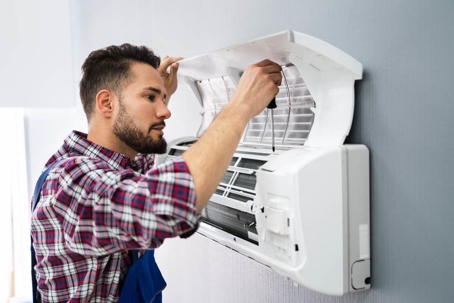Send us an email
Please enter your name and contact info.
Please enter your name and contact info.
Call Us Today! (850) 748-1066

Serving Families Throughout Pensacola

A ductless mini system is an energy-efficient alternative to window air conditioning units, space heaters, and electric baseboard heating. They’re ideal for home additions, new construction, garages, patios, sunrooms, and other rooms without ductwork that need heating or cooling.
These systems consist of an outdoor compressor/condenser and one or more indoor air-handling units. Each unit has its remote control and is connected to the outdoor unit by a refrigerant line.
A ductless mini system can be one of the most energy-efficient heating and cooling solutions available. Its high SEER (seasonal energy efficiency ratio) ratings allow it to use less electricity than a traditional air conditioning system, helping you save money on your utility bills.
Another key advantage of a ductless AC system is its flexibility to cool or heat specific rooms. It can also be integrated with wall units or radiant heating to provide a unified comfort system that can be easily controlled from a remote control.
Ductless mini-split systems are also energy efficient because they avoid duct losses associated with central forced air systems, which can account for up to 30% of air conditioning energy consumption. In addition, a ductless mini system doesn’t use a lot of electrical power to operate because it transfers heat rather than generates it.
Ductless mini-splits have become a popular option for homeowners who want a more efficient way to heat and cool their homes. These systems don’t require ductwork and are easy to install.
A ductless system can be installed in bedrooms, home offices, additions, and finished attics or garages. It can also be used to supplement existing ducted heating and cooling systems in spaces that don’t have convenient ductwork.
These systems use refrigerant piping and approved wiring to connect the outdoor unit to the indoor air handler. A professional installation is the best way to ensure that these systems operate efficiently and effectively.
While a ductless mini-split is more expensive than a standard baseboard or window unit, it will pay for itself in lower energy bills over time. This makes it a worthwhile investment for homeowners.
Ductless mini systems are an excellent option for homes that don’t have central air conditioning. They can also be used in room additions or apartments where installing ductwork would be costly and inconvenient.
Another great thing about a ductless mini system is the ability to regulate the temperature of each room, allowing for more personalized comfort options. For example, if one family member has an elderly relative or needs a more comfortable temperature while others prefer a cooler environment, a ductless mini system can be arranged to provide the right temperatures in each area.
Ductless mini splits also operate more efficiently than many traditional centralized AC systems because they don’t have to push air through ductwork. This allows them to use less energy and lower utility bills.
Ductless Mini Systems are quickly becoming a popular way to expand your heating and cooling capacity. Whether you have an older home that doesn’t have ductwork or are adding a room addition, these units can add significant energy efficiency to your space.
To keep your ductless mini system functioning at its best, you must perform routine maintenance. This will ensure that it’s working at maximum efficiency, helping to lower your energy bills.
It’s important to schedule regular maintenance visits with your local ductless HVAC technician so that they can take care of any small problems before they become larger. Besides checking your unit’s indoor and outdoor components for damage, your technician will also check the refrigerant tubing for leaks and recharge the refrigerant as necessary.
Maintaining your ductless mini system will extend its life by 10-15 percent compared to systems that are neglected. It will also help to avoid mid-season breakdowns.